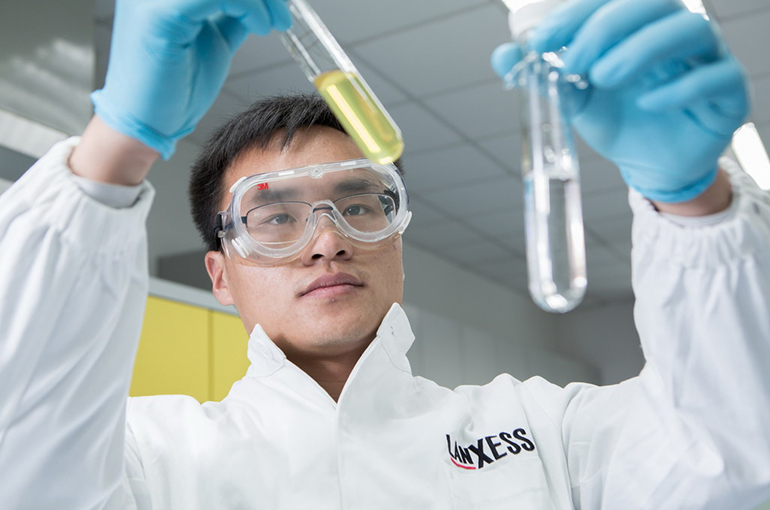 Foreign Chemical Giants in China Pivot to Meet Local Demand Amid Trade Tussle
Foreign Chemical Giants in China Pivot to Meet Local Demand Amid Trade Tussle(Yicai) April 10 -- Against the backdrop of intensifying international trade uncertainty, many big overseas chemical producers that operate in China have decided to put local needs first.
Lanxess, a German specialty chemicals maker spun off from Bayer Group in 2005, is optimistic about China's economic prospects and will focus more on demand in the country, Matthias Zachert, chairman and chief executive, told Yicai.
Despite headwinds in the global chemicals industry and a 5 percent sales decline, the Cologne-based firm’s earnings before interest, taxes, depreciation, and amortization soared 20 percent to EUR614 million (USD674 million) last year, mainly thanks to cost-cutting and improved efficiency.
Lanxess saved EUR110 million in costs, EUR20 million (USD22 million) more than expected. Moreover, the company divested its last polymer business in April 2024, taking a further step toward transforming into a specialty chemicals supplier.
Increasingly diverse demand in the Chinese market, especially that for sustainable high-tech chemical solutions, presents opportunities for Lanxess' technological innovation and product upgrading, said Michael Rockel, president of Lanxess China.
Since its spin-off and listing in 2005, Lanxess has established 10 subsidiaries as well as eight research, development, and production bases in China, Rockel noted. Its Asia-Pacific Application Development Center in Shanghai is one of the largest and most modern R&D centers in the APAC region and globally, and its factories in Qingdao and Ningbo have been successively upgraded and expanded, he added.
While Lanxess has resilient global production capabilities, the escalation of trade tensions will still affect the business and the overall chemicals industry, Zachert said.
Lanxess' sales and production capacity in North America account for about 30 percent of the company's total. Tariffs will increase raw material costs for its US factories, while reducing foreign competition, Zachert said, adding that American consumers will bear the brunt of price increases.
Syensqo, a Belgian multinational materials supplier, set up a regional headquarters in Shanghai last month. The Brussels-based firm aims to become a key player in China's development, participating in the country's low-carbon industry shift and supporting corporate innovation, said China General Manager Liu Yang.
Syensqo was created in December 2023 after Belgian chemicals giant Solvay was split into two entities. The company brings together Solvay’s most innovative business units, including specialty polymers, composites, Novecare, aroma performance, technology solutions, as well as oil and gas. It also encompasses four strategic growth platforms: batteries, green hydrogen, thermoplastic composites, and renewable materials and biotechnology.
China has become one of the most important hubs for chemicals globally, and about half of the world's chemicals will be made in the country in the future, according to Syensqo Chief Executive Ilham Kadri, so the company regards China as one of its most important markets.
In addition to the regional HQ, Syensqo also has a global innovation center and six production bases in China. It has completed the fourth expansion phase at its Chinese R&D center, adding biodegradation testing facilities and labs, including some for green hydrogen energy, electronic and electrical applications, semiconductor uses, microbiology, automation, and robotics.
Editor: Futura Costaglione